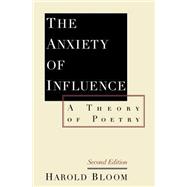
| Prologue: It Was A Great Marvel That They Were In the Father Without Knowing Him | p. 3 |
| Introduction: A Meditation upon Priority, and a Synopsis | p. 5 |
| Clinamen or Poetic Misprision | p. 19 |
| Tessera or Completion and Antithesis | p. 49 |
| Kenosis or Repetition and Discontinuity | p. 77 |
| Interchapter: A Manifesto for Antithetical Criticism | p. 93 |
| Daemonization or The Counter-Sublime | p. 99 |
| Askesis or Purgation and Solipsism | p. 115 |
| Apophrades or The Return of the Dead | p. 139 |
| Epilogue: Reflections upon the Path | p. 157 |
| Table of Contents provided by Blackwell. All Rights Reserved. |
The New copy of this book will include any supplemental materials advertised. Please check the title of the book to determine if it should include any access cards, study guides, lab manuals, CDs, etc.
The Used, Rental and eBook copies of this book are not guaranteed to include any supplemental materials. Typically, only the book itself is included. This is true even if the title states it includes any access cards, study guides, lab manuals, CDs, etc.